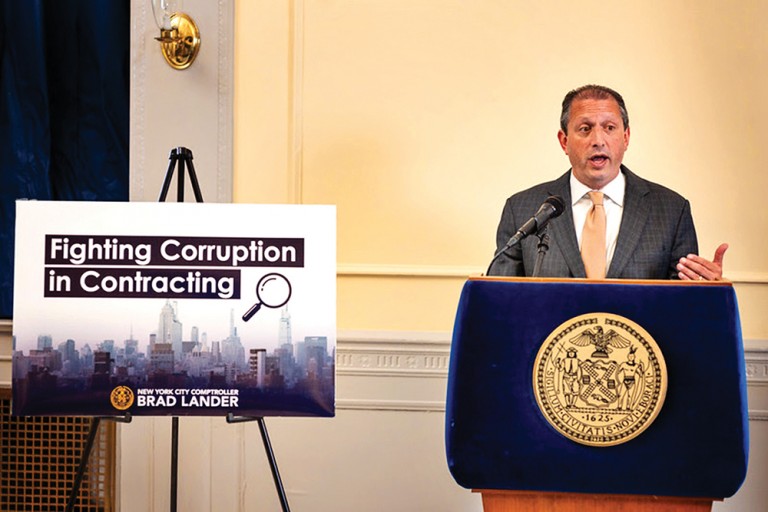By Michael V. Cusenza
With several scandals roiling the Adams administration, City Comptroller Brad Lander on Tuesday seized the opportunity to subtly slam Hizzoner via a new report that pours the foundation for four pillars aimed at eradicating fraud and corruption risks in government while strengthening oversight.
“Prevent Corruption in Procurement” recommends that the City:
- Strengthen oversight and accountability of subcontractors: While City procurement rules specify that each subcontractor must be approved by the contracting agency before starting the work, the reality is that those reviews, approvals and disclosures rarely happen. Across the three fiscal years since FY 2020, 17 agencies recorded no approved subcontractors in the City’s Payee Information Portal (PIP), as required. This basic lack of transparency has created significant risks for corruption and nepotism.
- Reduce over-reliance on emergency procurement and mitigate risks for corruption in non-competitive procurement: In emergency situations in particular, like a building collapse or rapid spread of Mpox, New Yorkers rely on the City to act as quickly as possible to avoid or mitigate an unforeseen circumstance. However, emergency procurements are exempt from certain transparency and accountability procedures that exist for other contracting methods, creating risks for corruption, fraud, and abuse. Similarly, non-competitive procurement processes, which are made available to provide agencies with the flexibility and streamlined processes they need to expedite high-priority projects and comply with Minority and Women-Owned Business Enterprises goals, come with less rigorous oversight measures creating risks for corruption, fraud, waste, and abuse.
- Close corruption vulnerabilities in the City’s oversight of not-for-profit human service contracts (per the 2021 Department of Investigation report): While the vast majority of human service nonprofits are dedicated to providing high-quality services and make best efforts to administer public funds responsibly, the 2021 Department of Investigation report revealed significant gaps in oversight that have increased corruption vulnerabilities. With over 40 percent of the City’s contracting portfolio and $12 billion in public funds dedicated to not-for-profit human services, Comptroller Lander echoes his office’s reform proposals that were made to the City in an October 2022 request to convene the City’s Procurement Policy Board emphasizing that the City must close corruption vulnerabilities in this sector to protect public integrity and restore trust in the non-profit institutions.
- Increase transparency to promote accountability, including the un-met promise of ContractStat: As a partner on the Joint Task Force to Get Nonprofits Paid on Time, Lander recommended the development of ContractStat, a system of performance management to shed light on where delays are occurring and direct agency and oversight efforts to clear backlogs and delays. This administration’s ongoing failure to meaningfully launch ContractStat and share information is extremely concerning. ContractStat alongside the additional disclosures of executive pay and recent history of campaign contributions would significantly strengthen transparency across all contract types to protect public integrity and prevent corruption and abuse.
“New Yorkers deserve an honest, trustworthy, well-managed city government that safeguards our taxpayer dollars against waste, fraud, and abuse,” Lander said. “We should use this moment of crisis to make real change—so people can wake up every day trusting that their government is working for them.”

